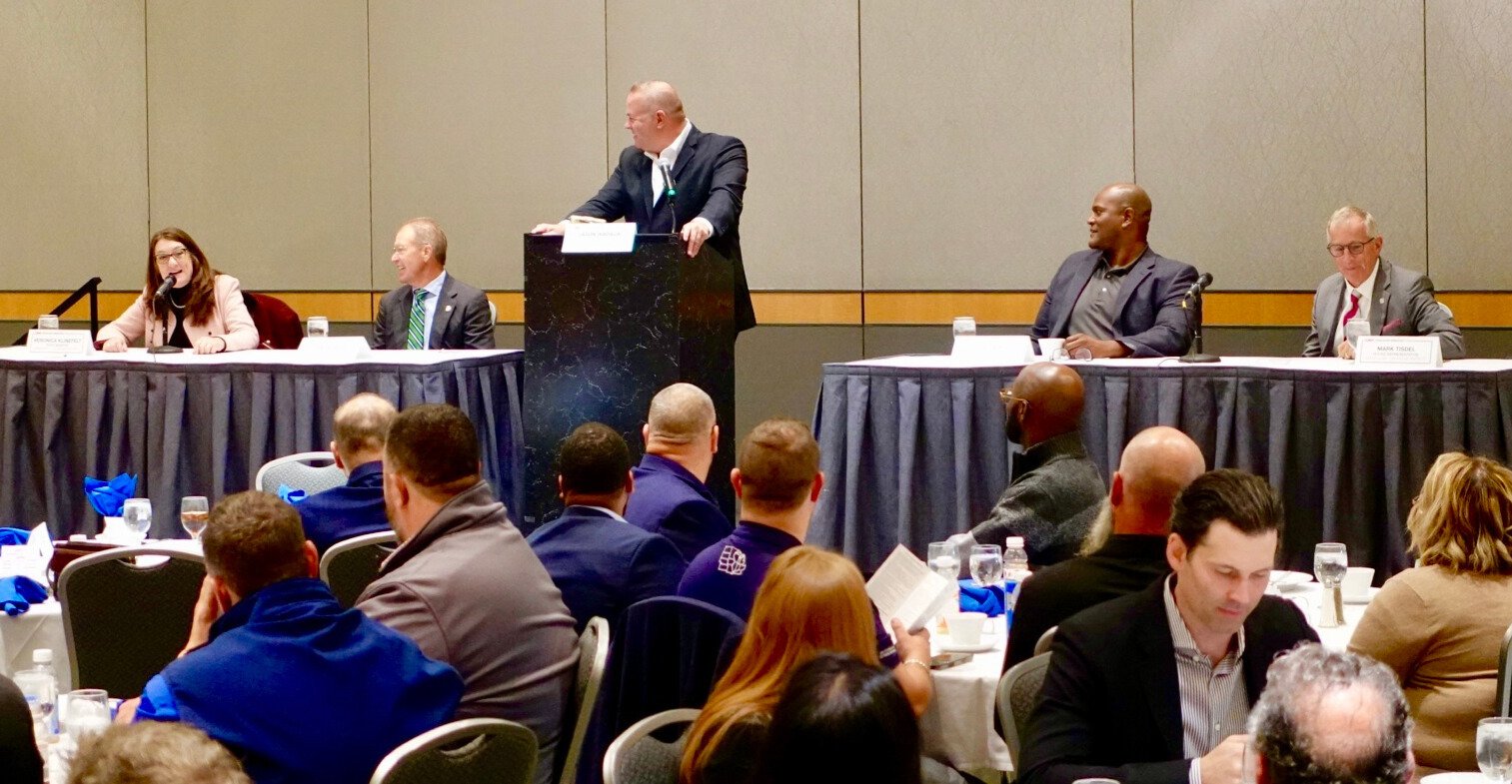
CAM's 10th Annual Legislative Breakfast Recap
 Infrastructure, Workforce, and the Road Ahead
Infrastructure, Workforce, and the Road Ahead
By HAVEN ALFONSI
The Construction Association of Michigan’s 10th annual Legislative Breakfast, which took place at the Somerset Inn in Troy on October 10th, 2025, gave industry leaders a glimpse at what Michigan legislators are working on in Lansing. Moderated by Jason Wadaga, lead lobbyist for Kindsvatter, Dalling & Associates, the bipartisan event welcomed the following panelists:
- Democratic Senator Veronica Klinefelt of the 11th Senate District
- Republican Senator Dan Lauwers of the 25th Senate District
- Democratic Representative Joe Tate of the 2nd House District
- Republican Representative Mark Tisdel of the 55th House District
Event Sponsors:
- Bricklayers & Allied Craftworkers, Local 2
- Laborers Local 1191 - LECET
- Mechanical Contractors Association of Detroit
- Michigan Regional Council of Carpenters
- Novara Law Group, PLLC
- Operating Engineers Local 324
- OPCMIA Local 514
- Painters & Allied Trades - District Council 1M
- Progressive Sweeping Contractors, Inc.
- Solxsys Administrative Solutions
Presenting Sponsors:
- BeneSys, Inc.
- CAMComp Workers’ Compensation Plan
- Construction Federal Credit Union
- International Building Products, Inc.
- Laborers Local 1076 - LECET
- R.S. Dale Company
- Watkins, Pawlick, Calati & Prifti, PC

Road Funding & The Michigan Budget
On October 7, 2025, Gov. Gretchen Whitmer approved Michigan’s 2026 fiscal year budget, which allocates $1.8 billion toward road improvements and transportation infrastructure. The first to speak on this issue was Sen. Veronica Klinefelt, chair of the Transportation Subcommittee. Overall, she said that $1.8 billion is not enough. “I’m shooting for 4 billion,” she said, “because, to me, that’s actually a long-term sustainable plan.”
Rep. Mark Tisdel chimed in to agree that Michigan has been underfunding its roads for a long time. “We’re 10th in the U.S. in lane miles,” he said. “For half a century or more, we’ve been about 30th in the U.S. in road spending. So, that’s a mismatch right there.”
Rep. Tisdel noted that Michigan ranks third in the nation for gas tax revenue that is diverted away from road funding. As it stands, 34% of taxes collected at the pump are used for services other than road funding. Both Democrats and Republicans were hesitant to increase taxes directly imposed on Michigan residents, so two things were done to secure a $1.8 billion budget for road funding. Firstly, during the upcoming fiscal year, the sales tax on motor fuel will be replaced with an increase in gas and diesel taxes, 100% of which will go toward road funding. This is only a temporary solution, according to Sen. Klinefelt, because the growing popularity of electric vehicles coupled with technological advancements that increase the miles per gallon for gas and diesel cars will continue to decrease the amount of motor fuel purchased in Michigan. Secondly, a 24% wholesale tax will be imposed on cannabis, with all of the money collected from that tax being put toward road maintenance.
Other parts of the road funding budget will be derived from federal funding and spending cuts elsewhere. Additionally, the Michigan legislature made the decision to decouple from the corporate tax relief outlined in the federal government’s One Big Beautiful Bill, choosing instead to dedicate a portion of corporate income tax to the road funding budget. Rep. Tisdel noted that this decision may not be particularly popular with the attendees of the Legislative Breakfast and other business owners. On the other hand, the changes in taxation may make it easier for business owners to make financial decisions.
“I know most of the people in this room are in business and hiring people and buying equipment,” Sen. Dan Lauwers said, “And it’s very difficult to hire people and buy equipment if you’ve got one-time funding. That’s one of the important things with this -- with this, you can count on this money going forward as a steady stream, so it makes some of those decisions about recruitment and investing in machinery a little bit easier.”
Notably, the upcoming fiscal year’s budget marks the first decrease in more than a decade. Importantly, Sen. Lauwers notes that this was done without cutting school funding. Another benefit to taxpayers is a new requirement that state buildings operate at a minimum of 80% capacity. This will increase governmental efficiency, Sen. Lauwers said, and “lead to benefits down the road.”
Another positive that the panelists discussed was the increased transparency of this year’s budget. In January, a House resolution was passed requiring that, for every legislatively directed spending initiative (LDSI), a form will be published online that details the sponsor, the purpose, and how the LDSI will impact a particular district. Additionally, LDSIs were limited to nonprofits. This initiative now applies to both the House and Senate. “That gives everybody a chance to see what’s being asked, and more specifically, who’s asking for it and why,” explained Rep. Tisdel.
All in all, the legislators seemed positive about the 2026 budget, hoping that the increase in road funding, school funding, and transparency will ultimately benefit Michiganders.
Earned Sick Time Act
On February 21, 2025, the new Earned Sick Time Act (ESTA) was passed. This act went into effect the day it was passed and requires that employers provide one hour of paid sick leave for every 30 hours worked, with an annual maximum accrual of 72 hours. For small businesses, the act went into effect on October 1st and requires that employees receive the same paid sick time benefits, with an annual maximum accrual of 40 hours.
Transitioning from the 2026 budget discussion, moderator Jason Wadaga asked the panelists what feedback they have received from constituents regarding ESTA. Sen. Klinefelt said that she mostly received feedback before the passing of the bill, when she met with Michigan businesses in an attempt to come to a solution that was sustainable for employers while also benefitting workers. She said that she voted yes on ESTA, but the majority of Democratic legislators did not.
“I look at it this way,” Sen. Klinefelt said, “If people on both sides of the aisle are unhappy, then it’s a compromise and it’s probably a good bill.”
Sen. Lauwers agreed that he has not heard much feedback since the passing of the bill, but suspects that this has little to do with constituent satisfaction. He remarked that, in his view, employers may be “just living with it.”
“When you run a business, you don’t have time to be pissed,” Sen. Lauwers said, "[Employers are] putting those policies in place, they’re not wasting time calling U.S. legislators saying, ‘you guys helped, but you didn’t help enough.’”
Rep. Joe Tate brought up the delayed enforcing of ESTA for businesses with 10 or fewer employees, which went into effect on October 1st. He acknowledged that it wasn’t a “perfect solution,” but that it provided some “breathing room” for Michigan’s small businesses.
Overall, the panelists expressed limited enthusiasm for the Earned Sick Time Act. “Sometimes what we’re left with is choosing the least worst option,” Rep. Tisdel said, “I think we’re a little bit better than that in the results, but avoided some real uncertainty and unanticipated, and even ‘unanticipatable,’ consequences for small businesses.”
Prompt Payment Act
Currently, all public construction projects in the state of Michigan are subject to prompt payment laws, requiring that contractors are paid for labor within a reasonable amount of time. Conversely, private commercial construction projects are not subject to these laws. The Prompt Payment Act aims to change this.
Rep. Tate and Sen. Lauwers have both been sponsors of this bill in prior sessions. Both agreed that the passing of this act is hugely important for Michigan’s construction industry. However, the reality of getting the bill passed is not so simple.
One source of delay, according to Rep. Tate, is the challenge of getting Michigan’s 148 legislators educated on the problem and focused on passing valuable and important legislation. Sen. Lauwers agreed, adding that another problem is the timing. Upcoming time off for holidays in November and December means that the legislature's work for the year is effectively nearing completion. With next year being an election year, Sen. Lauwers is concerned that it will be difficult to get the legislature to focus on the Prompt Payment Act.
Approaching Election Year
With current Gov. Gretchen Whitmer term-limited and unable to run again next year, there is a lot of interest in Michigan’s 2026 gubernatorial candidates. Much of this interest surrounds Detroit Mayor Mike Duggan, who has left the Democratic party to run as an Independent.
Sen. Lauwers pointed out that this may cause a significant change in the typical election process. “It’s a huge change factor in what we would expect as a normal Democrat versus Republican gubernatorial process,” he said. In most electoral races, there are two candidates left standing by the end. Here, however, we may see three candidates on the debate stage. Sen. Lauwers said that he is interested to see how the race progresses and how the introduction of a strong Independent candidate may change the typical election process.
There is also the question of Mayor Duggan’s overall popularity. While favored in the Detroit metropolitan area, he may not hold as much sway in other parts of the state. Sen. Klinefelt chimed in to add that, because Mayor Duggan defected from the Democratic Party, he may have issues winning the votes of those who specifically want a Democrat in office. However, she contended, “If he were to win, I think we would find him pretty easy to work with.”
Rep. Tisdel, who has officially endorsed Congressman John James in the gubernatorial race, offered a different perspective, saying that “politics in Lansing is a team sport” and an Independent governor would likely rely more on one team than the other. He suspects that, if elected, Mayor Duggan would end up leaning on the Democratic party because of prior affiliations.
Rep. Tate agreed that the legislature is a team sport. He also pointed out that he believes Mayor Duggan “did latch on to some of the discontent that Michigan residents, or Americans, have with the parties.” He said that this acknowledgement of discontent may encourage other candidates to start thinking more about meeting the needs of everyday Americans.
As the panel concluded, Rep. Tisdel recited a verse from “Go Get’em Tiger,” the Detroit Tigers theme song. “We’re all behind our baseball team,” he sang, reminding us that, despite our political differences, we are all Michiganders.
___________________________________________________________________________________________________
Panel Moderator

Jason Wadaga
Kindsvatter Dalling & Associates
Jason Wadaga serves as KDA’s lead lobbyist. He can typically be found in legislative meetings, committee hearings, and at legislative sessions representing KDA’s lobby clients. He also serves as the Executive Director for three of KDA’s association management clients, including the Construction Association of Michigan.
His career includes extensive experience in politics and the legislature. He started his political career as a sophomore at Northern Michigan University working on a variety of campaigns that brought him to Lansing. He spent nine years in the Michigan Legislature working in a variety of roles including serving as the Chief-of-Staff to State Senator Rick Jones before joining KDA. Born and raised in Michigan’s Upper Peninsula, Jason lives in East Lansing with his wife Kimberly and sons Nolan and Reid.
Recent Posts
-
CAM NewsBriefs – February 16, 2026
eNews
-
Recap: 2026 Great Lakes Design and Construction EXPO
CAM News
-
CAM Magazine's February 2026 Issue Is Ready to View
CAM Magazine
-
One Industry, One Resource: Why CAM Membership is the Ultimate Investment for Michigan Contractors
Member Benefit
-
CAM Introduces 2026 Board Members
CAM News
-
CAM Announces the 2025 Project of the Year
CAM News
